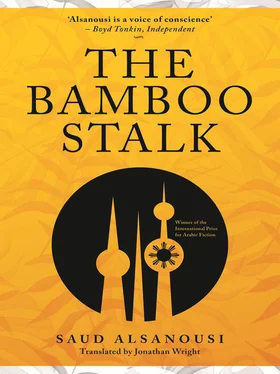José,
Don’t bother about the way you look. I don’t bother about the way I look. Prove to yourself who you are before you prove it to others. Believe in yourself, and those around you will believe in you, and if they don’t believe that’s their problem, not yours.
I don’t know whether you’ve turned Muslim in Kuwait or whether you’re adrift, looking for God in other religions. In any case, pray for me. Ask your Lord to wipe away the sins of Merla, your loving cousin.
I want to be pure because Rizal says the victim must be pure and spotless if the sacrifice is to be acceptable.
MM
When I’d finished reading Merla’s message, I was grateful that my television was turned on. The silent picture took me away from Merla’s sad and mysterious message to another, distant world. I picked up the remote control to raise the volume. It was a group of musicians with more than twenty-five men. They were arranged in lines wearing traditional clothes rather different from what I was used to seeing. The hems of their thobes and collars were embroidered in various colours. They had very wide, loose sleeves. Behind them there was a model of a wooden ship rather like the Kuwaiti emblem on the banknotes, and behind them there were Kuwaiti flags attached to the wall. The men in the middle row were holding tambourines and facing the camera. To their right there was a line of men facing a line to their left, clapping in the traditional style that I like. One of the men was moving freely between the lines holding a drum hanging from a strap around his neck. The line on the left and the line on the right moved towards each other till they were almost touching. The men were clapping and singing in unison. Then the two lines moved apart by stepping back, the men in each line holding hands with their neighbours. The songs changed. They made way for several men dancing those dances that I know well. They swung their shoulders forward, put their hands on their headdresses, which were thrown any old how, and jumped in the air. Then they turned backwards swaying. Their laughter was infectious and I laughed too. As they danced I left the laptop table for the middle of the room and ended up imitating their dance with a big smile on my face. With the men on the television screen, I had the same feeling I had had when I was with those crazy Kuwaitis in Boracay. I began clapping the same way as them. I swung my shoulders and did a turn. The men went back into their lines and the man with the drum appeared alone, prancing around between the lines of men. I went on dancing till I noticed that my phone was ringing.
‘Hello. Isa?’
‘Hi, Khawla.’
‘Could you turn down the music, Grandmother says.’
21
Eid al-Adha comes about two months after the feast at the end of Ramadan. I woke up early to the sound of the sheep in the inner courtyard. It was bleating, and the sheep in the neighbours’ houses bleated back, as if they were exchanging festive greetings or perhaps saying goodbye to each other before the mass slaughter in the morning, when their blood would flow into the street, to be washed away with water and disappear through the grating in the gutter nearby.
It was half past six in the morning. Before people started visiting Grandmother I had already finished having a shower in order to meet her, kiss her forehead, and wish her well on the occasion of the feast. I put on the new clothes I had bought specially for the occasion from the menswear shop near the central market: a white thobe, long white pants to go underneath, a white cap and a white headdress. Everything about me was white that morning, except for my shoes and my head ring, which were black. I stood in front of the mirror to look at myself. The only thing I recognised was my face.
I pushed the glass door. Grandmother was alone in the sitting room in front of the television screen, which was showing the same man in the bright blue jacket, apparently singing a different song from the one that had so excited Grandmother the previous time. I went up to her. She turned to me and looked into my face in disbelief. I bent down and kissed her forehead. The black ring fell off my head. I was flustered. I remembered the scene when the old Emir of Kuwait bent down to kiss the soil of Kuwait and his head ring fell off. It was a simple matter, no need to be flustered. I ignored the head ring and in my own special Arabic I said, ‘Happy Eid, Grandmother.’ She nodded but didn’t say anything. She was looking alternately at the wooden door at the front of the house and the glass door on the side. She was worried some visitor might come in and see me or that the servants might notice my clothes and their curiosity might lead them to realise who I really was. When I massaged her legs, she was careful to close the doors in case someone visited unexpectedly. And now it was Eid, so there might be many visitors.
I picked up the black head ring from the floor. I turned away from Grandmother now that I had fulfilled my wish to kiss her forehead, as I had seen my cousins do at the feast after Ramadan. ‘Isa!’ she called from behind me. I turned towards her. She beckoned me over, saying, ‘Come, come’ in English. Of course she could have said ‘ Taal ’ and I would have understood just as well. I walked back to her. She slipped her hand into her handbag and handed me twenty dinars, then waved me away as if anxious I should leave in a hurry. ‘Go, go,’ she said, also in English.
I took off my new clothes and called Ghassan and Ibrahim Salam to wish them a happy Eid. I sent greetings messages to Khawla and Hind. Then I lay on my bed and watched television. At half past eight, I received a text message from Khawla. Happy Eid, I want to see you about something , it said.
When it came to despicable behaviour Raju was a real professional. He had been gossiping maliciously about me to the servants in the houses nearby. Some of the servants had clearly passed on the gossip to their employers. Umm Jabir, the owner of the house next door, phoned on the morning of the Eid to wish Grandmother well and ask if she could borrow what she called ‘the Filipino man who works at your place’. ‘Raju says he’s a good worker. The men are going to meet for lunch in the diwaniya today and the cook’s busy. I need someone who can serve tea and coffee and juice,’ she said. Khawla said it was very bad for Grandmother. Umm Jabir was known in the neighbourhood for being nosy and gossiping in the women’s meetings that Grandmother was careful not to attend. Umm Jabir had recently retired from her job and she didn’t have anything to do but call up this or that neighbour and pass on news from here or there. She had no scruples about adding whatever details she felt like adding.
Grandmother tried to fob her off. She suggested Babu as an alternative to me.
‘No,’ said Umm Jabir.
‘Then Raju.’
‘No, no, the Filipino looks well-behaved,’ Umm Jabir said.
‘But he’s not good at serving.’
‘It’s easy. All he has to do is hold a tray and take it round to the guests.’ Umm Jabir’s insistence raised doubts in Grandmother’s mind. She did however send Khawla to tell me about it, not to consult me but to ask me to go and serve at Umm Jabir’s.
Khawla was angry. ‘Whatever Grandmother has done, make sure you don’t agree.’
I listened to her and thought to myself: ‘When I accepted Grandmother’s request that I hide my identity in front of the servants, it was because I understood it was temporary. When I promised not to say anything in front of Ahmad and Faisal, as if I was a servant, that was to save Nouriya and Awatif from disaster if their husbands found out. But to take it this far, that’s too much!’
Читать дальше












